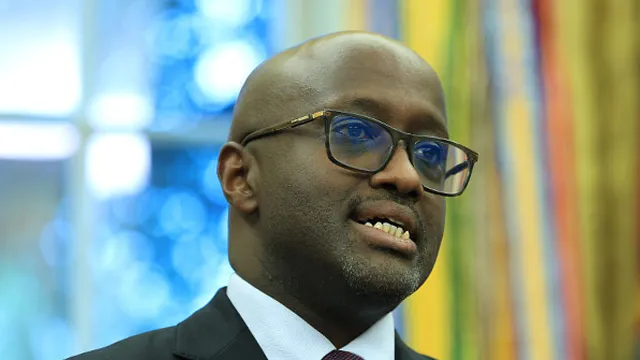
Congo and Rwanda sign peace deal to address conflict with US support
2025-06-30 00:00- The Democratic Republic of Congo and Rwanda formalized a peace agreement facilitated by the U.S. aimed at resolving decades of conflict.
- This accord includes provisions addressing the disarmament of armed groups while simultaneously addressing geopolitical interests in mineral wealth.
- Skepticism remains among analysts and local activists regarding the deal's lasting impact on peace and justice in the region.
Express your sentiment!
Insights
The Democratic Republic of Congo, a nation embroiled in conflict with more than 100 armed groups, signed a significant peace agreement with Rwanda, facilitated by the United States. This deal, signed in Washington, aims to bring an end to decades of violent fighting in eastern Congo, a region that has seen over seven million people displaced and termed by the United Nations as a severe humanitarian crisis. The agreement includes provisions for the respect of territorial integrity and the disarmament of non-state armed groups, primarily focusing on the notorious M23 rebel group, which has been a major player in the ongoing violence. The hope is that this deal will pave the way for more stability in the region while also granting the U.S. government and American companies access to valuable minerals in Congo, which are critical for technology production worldwide. However, skepticism remains about the deal's potential effectiveness, as past agreements have failed to bring lasting peace, and the M23 has indicated it may not comply with the terms outlined in the peace treaty. Additionally, analysts have raised concerns that the deal does not sufficiently address grievances from all parties involved in the conflict, particularly focusing on historical injustices, war crimes, and the complex power dynamics at play. The engagement of the U.S. may also be tied to economic interests, as the region is rich in untapped mineral resources estimated to hold significant economic value, suggesting that external motives could overshadow true peace efforts. Consequently, while this peace deal marks a crucial step towards addressing the ongoing conflicts, many doubt its ability to swiftly bring about lasting change without addressing the fundamental issues that have perpetuated unrest in the region.
Contexts
The history of conflict in eastern Congo is marked by a complex interplay of internal and external factors that have contributed to prolonged violence, humanitarian crises, and the destabilization of the region. Rooted in colonial legacies and exacerbated by the Rwandan Genocide in 1994, the conflict intensified as millions of refugees flowed into eastern Congo, leading to an influx of armed groups and a power vacuum that fostered lawlessness. The toppling of dictator Mobutu Sese Seko in the late 1990s by Laurent-Désiré Kabila's Alliance of Democratic Forces (ADF) ignited a series of wars that involved multiple foreign interventions and local militias, each pursuing its own interests, primarily in control of lucrative mineral resources such as gold, coltan, and diamonds. Subsequently, the First and Second Congo Wars, driven by regional dynamics and geopolitical interests, resulted in the deaths of millions and created a dire humanitarian situation that persists today. The aftermath of these wars saw the rise of numerous militia groups, many of which operated outside the control of any national authority. These armed groups often engaged in brutal tactics, including sexual violence, recruitment of child soldiers, and ethnic cleansing, which further destabilized communities and created deep-rooted animosities among different ethnic groups. The fragility of the Congolese state, compounded by widespread corruption and an inadequate response from the international community, has made efforts at peacebuilding exceedingly difficult. Despite the presence of a United Nations peacekeeping mission, MONUSCO, which has been deployed to help stabilize the region, challenges remain in securing lasting peace and addressing the root causes of the conflict, including economic disparities and social grievances. Efforts to broker peace have been met with mixed results. Various peace agreements have been signed, including the Sun City Agreement in 2002 and the 2013 Peace Framework, yet mistrust among parties and continued violence by non-signatory armed groups have undermined these initiatives. Moreover, the Congolese government's attempts to assert control over its territory have often resulted in clashes with militias, leading to cycles of violence that impede development and exacerbate the humanitarian situation. The lack of infrastructure and essential services exacerbates the plight of civilians, who face not only the threats posed by armed groups but also food insecurity and displacement, as millions are forced to flee their homes due to ongoing violence. Despite the challenges, there are glimmers of hope for a more peaceful future. Grassroots movements and civil society organizations are increasingly active in advocating for peace and justice, pushing for accountability and the protection of human rights. Recent political developments, such as elections and dialogue initiatives, have enabled some degree of political participation and representation, albeit under a backdrop of ongoing tensions. The international community continues to play a role in facilitating dialogue and promoting stability, but a comprehensive approach that includes social, economic, and political dimensions is essential for addressing the longstanding grievances that fuel conflict in eastern Congo. Only through concerted efforts can the region hope for sustainable peace and development.